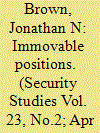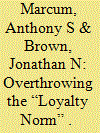| Srl | Item |
| 1 |
ID:
105849


|
|
|
| 2 |
ID:
072302


|
|
|
|
|
| Publication |
2006.
|
| Summary/Abstract |
There is a growing debate over the extent of consensus or divergence found within interdisciplinary International Studies (IS) programs. Unfortunately, with a few exceptions, this debate has taken place in the absence of empirical data. This article advances our understanding of the current state of IS curricula through an analysis of data generated from a survey of 140 interdisciplinary undergraduate IS majors across the United States. The surveyed programs comprise 63 Doctoral/Research institutions, 40 Master's institutions, and 37 Baccalaureate institutions found in 38 states and the District of Columbia. The 140 programs are analyzed in terms of six basic components: introductory course(s), research methods, capstone course(s), area and/or thematic concentrations, study abroad, and foreign language requirements. The findings demonstrate significant areas of both consensus and divergence in IS programs.
|
|
|
|
|
|
|
|
|
|
|
|
|
|
|
|
| 3 |
ID:
149469


|
|
|
|
|
| Summary/Abstract |
What explains variation in the depth of intelligence sharing? Realism provides the standard answer: shared threat motivates deeper cooperation. In a recent article, Ryan Bock offers a liberal antidote to this conventional view, leveraging insights on domestic regime type to explain why Anglo-Soviet sharing remained shallow despite the German threat during 1941–5. Several shortcomings in Bock’s innovative study undermine his main arguments and findings. A reevaluation of the Anglo-Soviet case and a cursory examination of nine other intelligence-sharing relationships during the Second World War reveal a spread of variation in the depth of cooperation that cannot be explained by a liberal regime-type argument, a realist threat perspective, or other prevailing International Relations paradigms. Marrying insights from interdisciplinary scholarship on gossip and embedded exchange, we propose a novel alternative framework that suggests plausible solutions to puzzles left behind by other accounts, thus opening a new line of inquiry for future research on intelligence cooperation.
|
|
|
|
|
|
|
|
|
|
|
|
|
|
|
|
| 4 |
ID:
165319


|
|
|
|
|
| Summary/Abstract |
When and why do friendly states deliberately share and unwittingly accept fabricated intelligence about others? Recent work on the interpersonal foundations of security cooperation suggests intelligence liaison is a type of embedded relationship that requires a dependable route for exchange (close personal ties) and a consistent record of exchange (reliably meeting expectations). We extend this argument to show that the relational embeddedness underpinning truthful intelligence liaison also explains the sharing of fabricated intelligence. We argue that intimate personal relations and a history of reliable exchange create a channel for effectively transmitting false information, for the recipient is unlikely to challenge its authenticity, and that violated cooperative expectations provide a reason for attempting to deceive a partner. Drawing on extensive archival research, we evaluate our theory by analyzing Britain's decision to share fabricated intelligence about Germany with the United States in 1941.
|
|
|
|
|
|
|
|
|
|
|
|
|
|
|
|
| 5 |
ID:
132391


|
|
|
|
|
| Publication |
2014.
|
| Summary/Abstract |
Why might public acknowledgment of cooperative security negotiations generate bargaining constraints that provoke stalemate? Previous scholarship points to aroused public opinion. Yet in many cases where hard-line bargaining stances develop and talks collapse following public acknowledgment, it is not domestic political pressures that tie leaders' hands. This article examines instead an international constraint attendant to publicity: opposition by third-party states. I argue that international power position shapes the balance of vulnerability between the negotiating parties to abandonment and entanglement. The act of official acknowledgment can constrain the more vulnerable partner by enabling third-party states to credibly scrutinize its intentions. By threatening strained relations, such scrutiny can create a security dilemma that reduces the weaker partner's bargaining range to a choice between cooperation on its terms and noncooperation. I evaluate this argument by studying foreign military basing negotiations. Statistical analyses and a comparative case study produce strong support for my argument.
|
|
|
|
|
|
|
|
|
|
|
|
|
|
|
|
| 6 |
ID:
143345


|
|
|
|
|
| Summary/Abstract |
This article examines two competing theories that link variation in the size of a winning coalition to its members’ incentives and ability to orchestrate coups d’état against authoritarian leaders. Selectorate theory’s “loyalty norm” focuses on the incumbent’s ability to buy support and the challenger’s inability to guarantee inclusion in a future coalition. It suggests that, in small-coalition systems, the probability of coup attempts and successes decreases as coalition size decreases. We develop an alternative theory of political accountability that focuses on a coalition’s capacity to coordinate sanctions against a leader. It generates a rival expectation—in small-coalition systems, the probability of coup attempts and successes increases as coalition size decreases. We evaluate these hypotheses through quantitative tests on coup attempts and successes during 1950 to 1999 and with an illustrative case study of the Saint-Sylvestre Coup in the Central African Republic. These analyses provide strong support for our theory of political accountability.
|
|
|
|
|
|
|
|
|
|
|
|
|
|
|
|